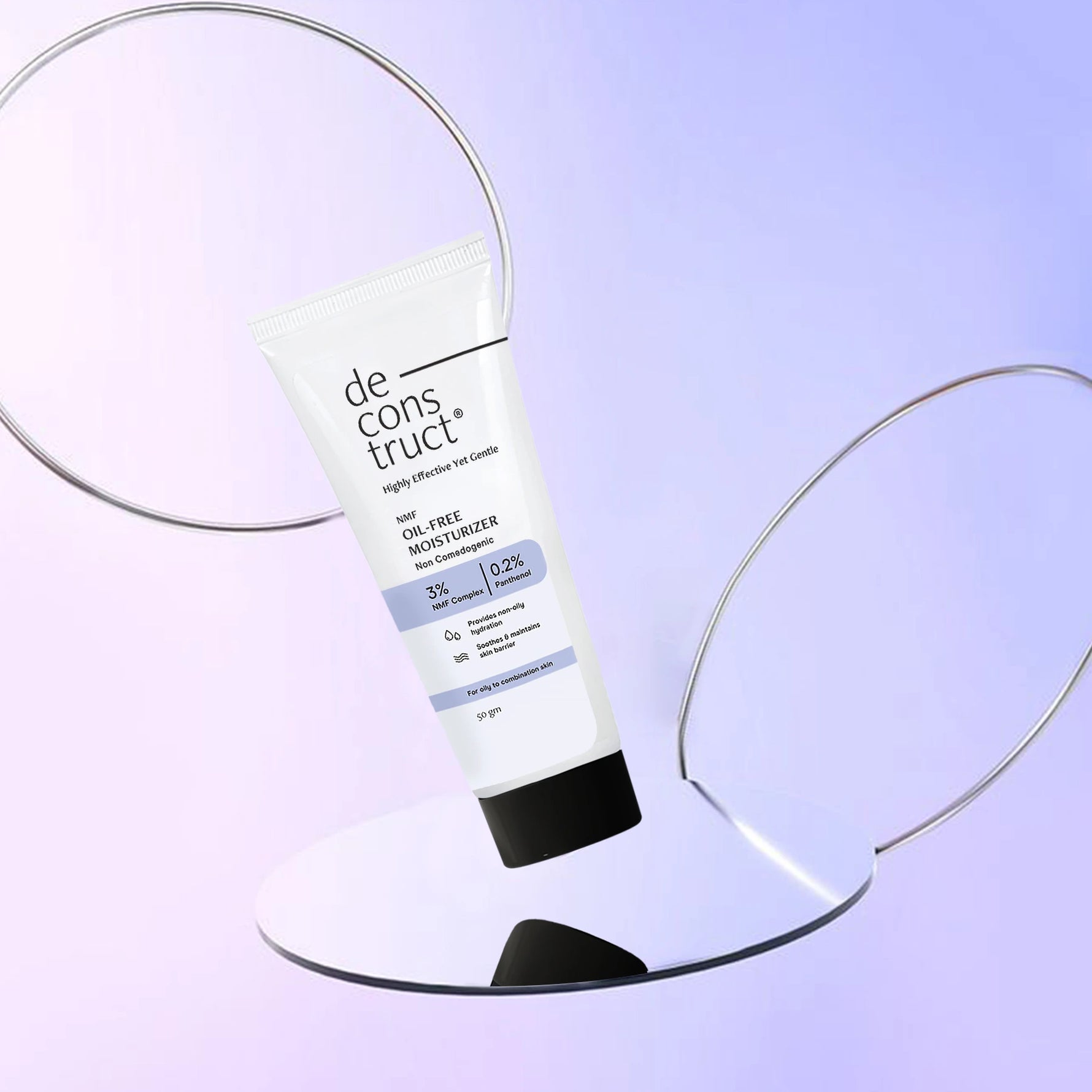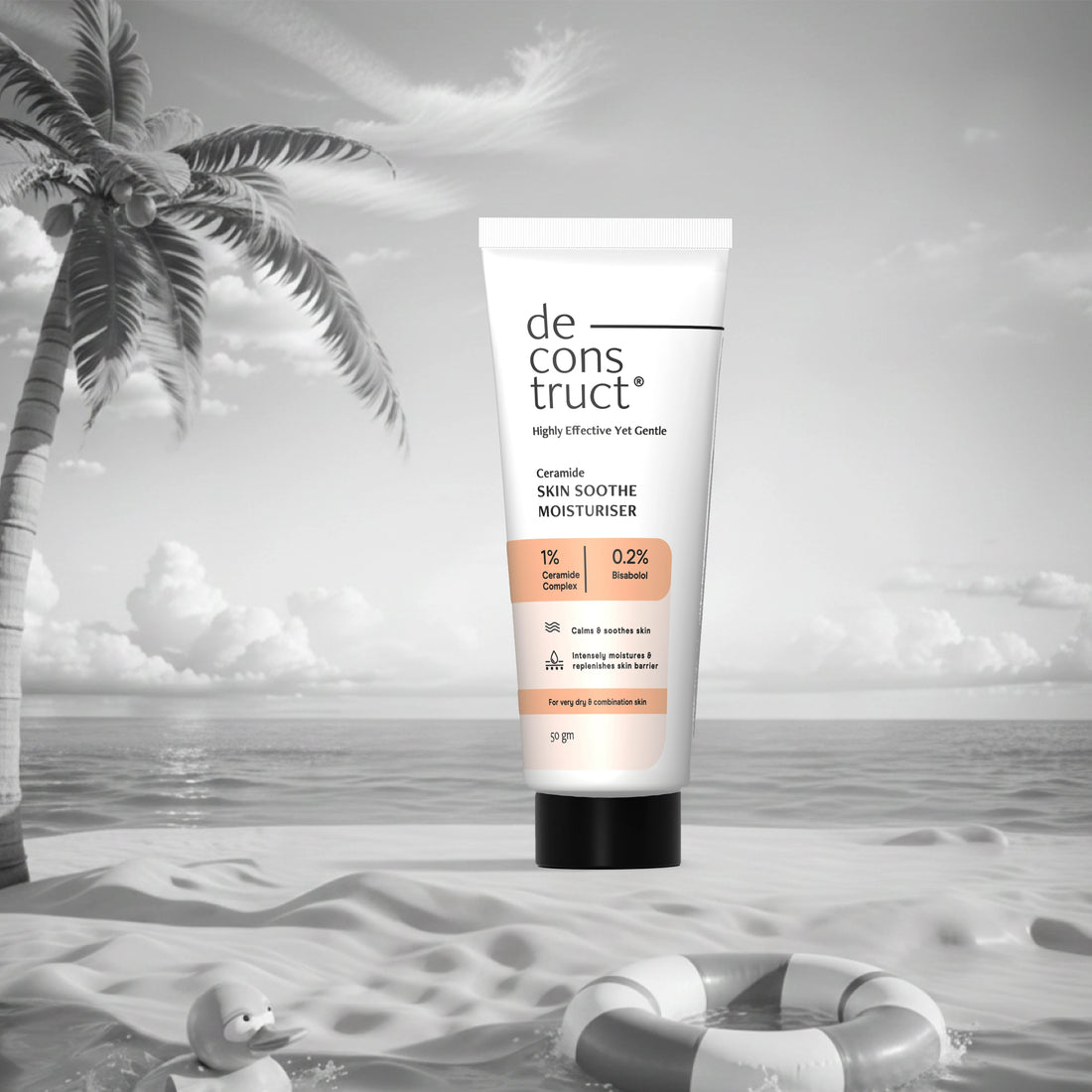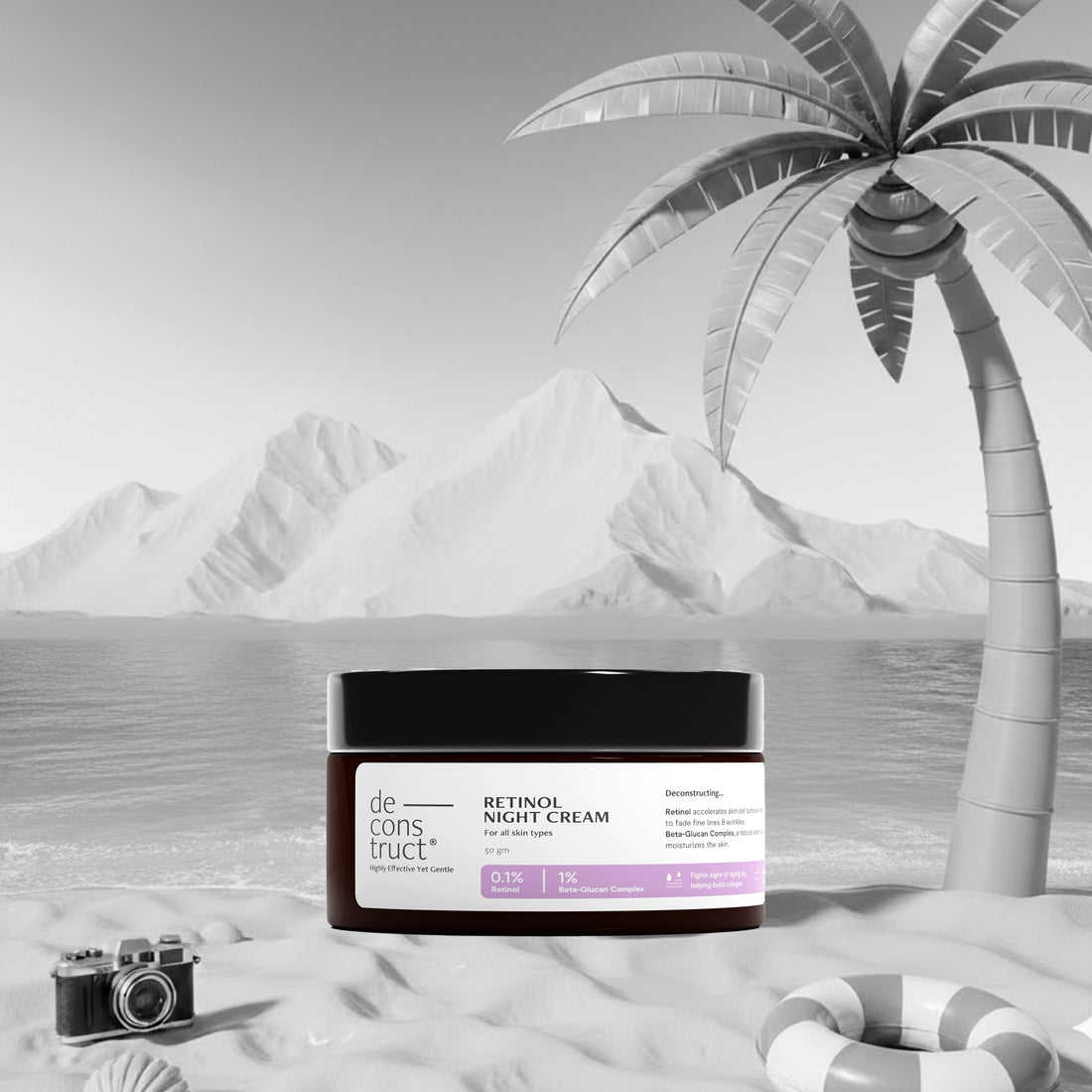If you have breakouts and oily skin, you’ve probably asked yourself questions like “do moisturizers cause acne?”, especially in hot, humid weather like in many parts of India, where skin already feels greasy.
The truth is, a well-formulated moisturizer does not cause acne. In fact, the right one can actually help calm and support acne-prone skin. The problem usually isn’t the idea of moisturizing, but what kind of moisturizer you’re using.

Deconstruct — Oil-free Moisturizer for Oily Skin
An oil-free moisturizer is a formula that hydrates your skin without added oils that are more likely to clog pores. Instead, it uses light water-attracting ingredients (like humectants) and very lightweight emollients so your skin gets moisture and does not get as oily.
In this guide, you’ll learn:
-
Why is an oil-free moisturizer good for acne
-
How to know if moisturizer is oil-free just by reading the label
-
How to choose moisturizer for oily skin based on your skin type
-
How to use an oil-free moisturizer in your day and night routine for better acne control
You can also explore our blog on understanding oil-free moisturizers for oily and acne-prone skin for a deeper dive into oily-skin hydration.
2. Awareness Stage: Is an Oil-Free Moisturizer Good for Acne-Prone Skin?
2.1 Why Acne-Prone Skin Still Needs Moisture
Harsh cleansers or treatments can strip your skin of moisture, and if you skip moisturizer after, your skin can get dehydrated underneath. In response, it may produce more oil to compensate. Over time, that extra sebum, along with dead skin and bacteria, can contribute to clogged pores and breakouts.
Hydration helps reduce sensitivity and redness by keeping the outer skin layers flexible instead of dry and cracked. Hydrated skin is also less likely to feel tight and overproduce oil as a response.
So if you’re wondering “is moisturizer necessary for oily skin?” – yes, especially if you’re dealing with acne or using acne treatments.
2.2 Benefits of Oil-Free Moisturizers for Acne
Here are the key benefits of oil-free moisturizer when you have oily or acne-prone skin:
-
Non-comedogenic: “Do moisturizers cause acne?” not if you use formulas that do not clog pores.
-
Lightweight, gel/water-based textures: These absorb quickly, don’t form a heavy layer on top of your skin and work well under sunscreen.
-
Calms inflammation & redness: Ingredients like panthenol, soothing humectants and barrier-supporting complexes help reduce irritation. Panthenol in particular has been studied for its ability to boost hydration, support the skin’s repair process and soothe redness, which is why it’s commonly used for sensitive and acne-prone skin.
-
Controls shine: Many oil-free formulas leave a fresh, non-greasy finish, so your skin feels comfortable.
Deconstruct Oil-Free Moisturizer for Oily Skin is built exactly this way. With 3% NMF Complex and 0.2% Panthenol it gives up to 72-hour hydration without clogging pores or feeling sticky. The 3% NMF Complex which is a mix of humectants and amino acids that mimic your skin’s own Natural Moisturizing Factors, helps attract and hold water in the outer layer of the skin, while 0.2% Panthenol (Pro-Vitamin B5) supports barrier repair and soothes redness.
2.3 Who Should Use an Oil-Free Moisturizer?
Oil-free moisturizers work especially well if you are:
-
Teenagers with hormonal acne and constant shine
-
Adults with oily, combination or sensitive skin
-
People using acne treatments like AHAs, BHAs, benzoyl peroxide or retinoids, which can dry or irritate skin
3. Consideration Stage: How to Know if a Moisturizer Is Truly Oil-Free?
3.1 Check the Ingredient List
If you want to be sure and are wondering exactly how to know if moisturizer is oil free, start with the packaging and ingredient list:
-
Look for words like “oil-free,” “non-comedogenic,” and “lightweight” on the label. These terms indicate that the formula is designed for oily skin and has been created to minimize pore blockage.
-
Check for oils like coconut oil, mineral oil, almond oil, or rich butters as these are better suited for dry skin and may not suit acne-prone skin.
Prefer formulas that mention light hydrators such as:
-
Glycerin – draws water into the upper layers of the skin
-
Panthenol (Pro-Vitamin B5) – supports barrier repair and helps soothe irritation and redness, useful when skin is inflamed from breakouts or actives
-
Natural Moisturizing Factor (NMF) components – ingredients like amino acids and sodium PCA that mimic your skin’s own natural hydrators to improve water retention
-
Hyaluronic acid – helps bind water and makes skin look plumper without adding oil
3.2 Texture & Formulation Clues
You can also use texture as a quick guide to choose best moisturizer for oily skin:
-
Gel or gel-cream: Usually best for oily and acne-prone skin since it's lightweight, water-based, fast-absorbing
-
Light lotions: Can work for oily skin if they’re specifically labelled oil-free
-
Heavy creams and balms: Often made for dry skin, they can feel suffocating or greasy on oily skin
A good oil-free moisturizer should:
-
Absorb quickly
-
Leave no greasy cast
-
Feel comfortable even in hot, humid Indian weather
4. Decision Stage: Which Is the Best Oil-Free Moisturizer in India?
If you’re unsure how to choose moisturizer for oily skin, use this as a quick guide:
|
Skin situation |
What to look for in an oil-free moisturizer |
|
Extremely oily skin |
Very lightweight gel, oil-free, non-comedogenic, shine-controlling |
|
Oily + sensitive skin |
Fragrance-free, alcohol-free, soothing ingredients like Panthenol, NMF |
|
Oily + acne-prone skin |
Oil-free + pair with anti-acne actives (salicylic acid, niacinamide) in routine |
|
Oily skin in summer |
Gel texture, quick-absorbing, non-sticky |
|
Oily skin in winter |
Same oil-free base, but layer over hydrating serum if you feel tight |
*This table is a general guide – always adjust based on how your own skin feels.
4.3 Mistakes to Avoid When Selecting a Moisturizer
-
Avoiding moisturizers entirely because it caused breakouts. Chances are the formula didn't suit your skin type.
-
Choosing alcohol-heavy formulas that feel matte but can dehydrate and irritate your skin.
-
Using thick creams meant for dry skin can increase congestion on oily, acne-prone skin.
5. Retention Stage: Is It Necessary to Moisturize Oily Skin at Night?
5.1 Why Night-Time Hydration Is Important
Night is when your skin works on repairing the barrier and recovering from daily environmental stressors. If the treatments you use are drying or irritating, you should use a gentle moisturizer to keep the skin barrier supported.
At night, transepidermal water loss naturally rises, so an oil-free but barrier-supporting moisturizer helps prevent your skin from getting overly dry or irritated while you sleep.
So, is moisturizer necessary for oily skin at night? Absolutely .
5.2 How Much Moisturizer to Use at Night
-
Use a pea-size amount for the whole face, depending on your face size.
-
Spread gently on slightly damp skin after your treatment serum (optional).
5.3 Night Routine for Acne-Prone & Oily Skin
Here is a quick night routine you can follow:
-
Start with a cleanser that is gentle yet removes the extra oil buildup from the skin.
-
Follow up with a treatment of choice, depending on your specific concerns.
-
Apply an oil-free moisturizer with a non-comedogenic formula.
6. How to Use Oil-Free Moisturizer for Maximum Acne Control
To get the best results from an oil-free moisturizer for acne-prone skin:
-
Apply on slightly damp skin after cleansing or water-based serums. This helps lock in water.
-
Use twice daily, in the morning and at night, for maximum benefits.
-
Follow with a broad-spectrum, non-comedogenic gel sunscreen for oily skin in the morning.
-
Apply a small amount behind your ear to patch test before use if you have sensitive skin.
7. Conclusion: Final Advice for Acne & Oily Skin Care
In conclusion, it's important to understand that moisturizers do not lead to breakouts. The focus should be on whether a specific formula is appropriate for oily, acne-prone skin.
Opting for oil-free and non-comedogenic moisturizers can be a great decision, as they provide necessary hydration without contributing to clogged pores.
Even oily skin requires moisture, so using a lightweight, oil-free moisturizer is essential. By maintaining a simple, oily skin focused skincare routine and allowing your skin to adjust, you can achieve a balanced skin.
8. FAQs
1. Are oil-free moisturizers better for all skin types?
Not necessarily. Oil-free formulas are especially good for oily, combination and acne-prone skin. If your skin is very dry, you may need a richer cream with more emollients and occlusives.
2. Will oil-free moisturizers prevent future acne?
An oil-free moisturizer can reduce the chance of product-related clogged pores, which helps, but it doesn’t control acne caused by hormones, diet or genetics.
3. Can oily skin skip moisturizer in summer?
Even in hot, humid Indian summers, it’s advised not to skip moisturizer. Opt for a very light, oil-free formula. This keeps your skin hydrated without extra shine and works well under sunscreen.





